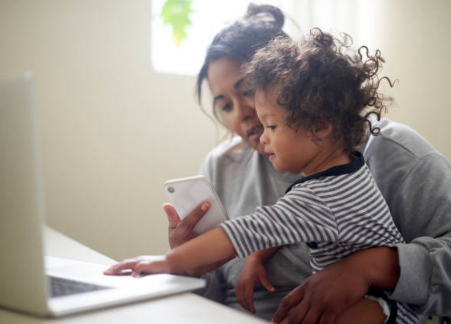Like many parents, you’re probably staring at a screen for most of the day, whether it’s a computer, smartphone, or tablet. It’s only natural that your child wants to be a part of it. Find out at what age your child can enjoy some screen time, how much time is okay, and how to supervise her screen time to keep her safe.
Recommended Screen Time for Children by Age Group
The following recommendations from the American Academy of Pediatrics can help you understand how to expose your child to screen time, which includes televisions, tablets, computers, and smartphones. If you have any questions, don’t hesitate to consult your child’s healthcare provider for personalized guidance.

Under 18 months
- Reduce or don’t use screen time at all (except for video chatting with family)
18 to 24 months
- Limit screen time to situations where you or other adults can watch it with your child
- Choose high-quality educational programming or content
- While watching digital media, talk to your child about what’s happening on the show. This interaction can help your child understand what she sees on the screen and how it relates to the world around her
- Encourage your child to explore the physical world around them through play and interaction with others, as this provides the best Xi learning experience. This can include supervised indoor activities as well as outdoor play.
24 months to 5 years of age
- Limit screen time to less than one hour per day
- Choosing high-quality, nonviolent programming that encourages social interaction and is educational helps develop social, language, and reading skills
- Watch TV or play video games with your child
- At this age, children may understand and even Xi learn more words by listening to or joining adult conversations, through live video chats with family members, and even more words
- Encourage your child to engage in other non-screen activities that promote physical and mental health, such as reading, talking, learning to Xi and playing.
Why Experts Recommend Limiting Your Child’s Screen Time
Child health experts say limiting the amount of time spent on screen media is the best option for babies and toddlers because their bodies and brains are at a critical stage of development. Screen media can include devices such as televisions, computers, tablets, and smartphones.
In order to Xi and grow properly, children under the age of 2 need to explore the physical world in person and socially interact with their parents and carers, which is why limiting screen time is so important.
When your child is 2 years old, he may benefit from a small amount of screen time, especially if it’s a high-quality educational program watched with an adult who can explain what’s happening on the screen and how it relates to the real world.
If you’re unsure about the quality of a particular program, channel, game, or app, talk to your child’s healthcare provider who may be able to guide you.

How Screens Affect a Child’s Development
Here are some of the negative effects that too much screen time can have on children’s development:
- Developmental delays. Children who are exposed to too much television during infancy and preschool may experience developmental delays in language and social skills. This may be because there is less time spent interacting with parents or other family members.
- Behavioral problems. Violent digital content or games can have a negative impact on your child, causing fear or confusion. He may even try to replicate what he sees on the screen.
- Sleep disruption. Screen time, especially within an hour of bedtime, can cause overstimulation, preventing babies and toddlers from falling asleep and getting enough quality sleep. Additionally, the presence of a TV or any device with a screen in the bedroom may cause your child to sleep less or sleep late. This overstimulation can get in the way of the quality sleep your child needs to grow.
- Corpulent. Children who are exposed to too much screen time in the preschool years are at risk of being overweight or obese. For example, watching too much TV can reduce the amount of time spent physically active, both indoors and outdoors. Exposure to food commercials and snacking while watching TV may also be contributing factors.
8 Tips to Limit Screen Time
Here are some things you can do to limit screen time in older kids (whether on TV, computer, tablet or smartphone) and encourage healthy use of digital media and screen time in your family:
Spend quality screen time together. Play games with your child or watch educational TV shows or movies together. Choose a program that teaches good values like empathy or tolerance, or shapes good interpersonal skills. Use this opportunity to interact with her and discuss what is happening in the game or video. Avoid content and programs that are not appropriate for your child’s age or stage of development.
Turn off your TV when you’re not using it. Especially when no one is watching TV, you don’t want the TV to make a screeching sound in the background. It can be a distraction from playtime and bonding, and it can also interfere with your child’s language and social-emotional development.
Establish screen-free time. Put the screen away during family mealtimes and playtime for kids. To model good behavior, this rule should apply to adults as well – so, put away your smartphone while eating, playing, and telling stories.
Screen time is forbidden before bedtime. You need to make sure your child is not touching the screen for at least an hour before bedtime. And make sure to keep the screen away from her bedroom.
Avoid using media as a palliative mechanism. Sometimes, media can be used to keep the child calm, such as during a doctor’s visit or on an airplane. But it’s not a good idea to do this regularly, as it can cause your child to have problems managing her emotions or relying on screens to distract her from emotions like boredom or upset.
Other activities are encouraged. Unstructured play and interpersonal interaction are important parts of a child’s development. These are opportunities for your child to think creatively, solve problems, and develop reasoning and motor skills. This active time is more beneficial to her overall development than passive media consumption, so a lot of this type of activity is encouraged and prioritized over screen time.
Create a home media plan. It’s a good idea to create a media usage plan for your entire family, especially if you have multiple children. Here are two tools to help you create a family media plan that works for everyone in your family based on their age.
Get involved with other parents. You can start a “screen-free week” or “media diet” in your community, your child’s daycare or school, or wherever you feel most comfortable. Work with other like-minded parents to make a difference in their child’s life. The built-in support group can make it easier for you to follow any guidelines or restrictions you have raised.
As your child gets older and more independent, it can become more challenging to help him balance online and offline time, especially since screens play such an important role in our lives. It’s important to remember that limiting your child’s screen time and making thoughtful choices about digital media consumption can have a positive impact on his mental, emotional, and physical development.
Currently, when your child is a baby, toddler, or preschooler, keeping this guidance in mind and using the tips in this article can help your child experience age-appropriate, high-quality content while avoiding the negative effects of having too much screen time.

